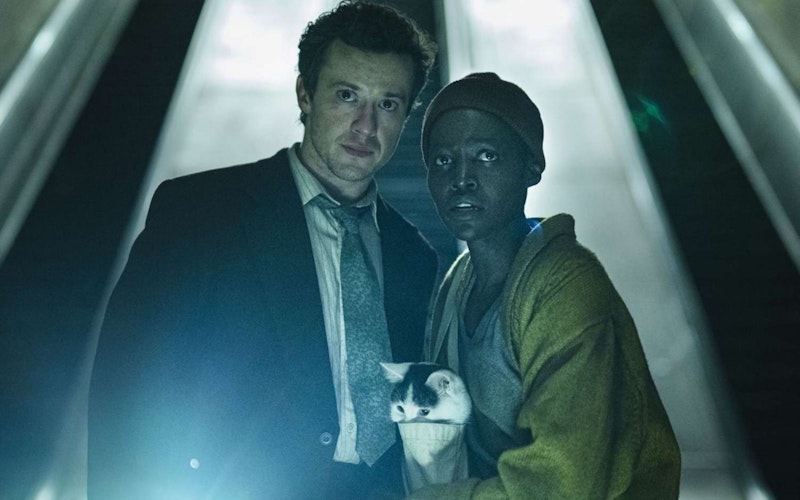
Movies
Loving the Stranger in A Quiet Place: Day One
Movies about the end of the world often subliminally ask profound existential questions. What do we value most when all seems lost? What are you willing to do to survive? Of the many entries within this prolific apocalyptic genre, few provide more compassionate, grace-filled, and gospel-centered answers than The Quiet Place: Day One.
Following the massive success of 2018’s A Quiet Place, and 2020’s A Quiet Place Part II, A Quiet Place: Day One shifts the setting from rural America to arguably the most represented urban center in cinema: New York City, on the first day of the alien invasion. Sightless monsters descend from the sky, ruthlessly slaughtering every inhabitant on the island of Manhattan unfortunate enough to make noise. The shift in setting from rural to urban comes with a change in director, as John Krasinski entrusted this installment of his brainchild to Michael Sarnoski, best known for his indie darling Pig. And yes, although massive in scale and spectacle, this studio film achieves a sense of intimacy more common in much smaller projects.
Sarnoski’s unlikely heroine is a feisty hospice patient named Samira (Lupita Nyong'o), a poet afflicted in the prime of life with terminal cancer. When her nurse (Alex Wolff) gently scolds the understandably bitter Samira for her anti-social behavior during a group therapy session at the hospice, she retorts, “I am a very mean person.” Resisting the inertia of her cancer-ridden body, Samira reluctantly agrees to one last field trip into the city with her fellow patients to see a theater production. Her one condition: the group must stop for authentic NYC pizza on their way back. (Spoilers ahead.) Before the group gets to the meal, however, the aliens—known as Death Angels—descend.
Surrounded by a multitude of swift and gruesome deaths, Samira and her resourceful “service cat” Frodo somehow survive. In a virtuoso performance, Nyong'o’s stunningly expressive face repeatedly reflects the utter awfulness of the apocalyptic setting. Indeed, in the best tradition of less-is-more horror, Nyong'o’s complicated facial responses prove more cinematically evocative than the few times Sarnoski’s camera actually shows the graphic and pervasive violence. But within this hellscape of brutal carnage, our unlikely heroine does more than survive. Almost against her will, this “very mean person” repeatedly loves and protects the terrified strangers she encounters along her way.
Our unlikely heroine does more than survive.
With death imminent from either cancer or slaughter, Samira forgoes the unlikely hope of escape from the island in favor of the possibility of one last slice from her favorite pizzeria in Harlem. But she just can’t stop helping people along the way. Before she can even eat the candy bar she scavenged from an abandoned bodega, Samira notices a teenage boy and his younger sister fearfully huddled under the spout of a park fountain, the din of trickling water providing camouflage from the sound-hunting aliens. Like a true good Samaritan, she gently draws the children out, gives them her only candy bar, and guides the kids toward others who might help make their way to rescue boats on the south side of the island. While the other survivors tread south, Samira continues her quest north toward Harlem.
Yet again, Samira’s proclivity for showing kindness to strangers interrupts her solitary journey. Over 37 minutes into the film, a traumatized English law student named Eric (Joseph Quinn) dramatically surfaces from a flooded subway stairwell. A force that he cannot resist draws him to Samira (and her cat). When she gestures to the boyish stranger to leave her alone and head south, Eric’s frightened, doe-like gaze confronts her. Under the protective patter of rain beating against a construction awning, he whispers, “I’m really scared. I don’t want to die here.” Samira takes pity on him and reluctantly agrees to let the hapless immigrant join her pizza pilgrimage. In doing so, she inadvertently fulfills the biblical call from Leviticus: “The foreigner residing among you must be treated as your native-born. Love them as yourself. . .”
For the remainder of the film and with limited dialogue, these destitute strangers valiantly serve, comfort, and care for one another. Samira bravely calms Eric during a hyperventilating panic attack, even as a vicious alien stalks them in a flooding subway tunnel. Eric selflessly risks his life to scavenge pain medication for his suffering companion from an abandoned pharmacy. Later, he creatively finds a way to fulfill Samira’s seemingly foiled pizza quest. This loving act leads to a magical scene of joyful revelry in which Eric raises his newfound friend’s spirits with a pantomimed vaudevillian magic show, playfully performed in silence. The show culminates in a glorious bow in which both characters cathartically revel in a cascade of imagined applause. Their impromptu, daylong, platonic friendship is so sincere and established by the end of the film that it's no surprise when Samira willfully offers her life so that Eric (and her cat) may live.
In the best tradition of apocalyptic fiction, A Quiet Place: Day One answers the question, “What do we value most when all seems lost?” This story's resolution avoids the all-too-human responses to devastating turmoil, such as more violence, scapegoating, and self-preservation at all costs. Rather, the answer arrives in a litany of biblical norms: love the stranger, practice hospitality, and, when necessary, lay down your life for a friend.
_______________
At Think Christian, we encourage careful cultural discernment. We recognize and respect that many Christians choose not to engage with pop culture that contains particular content, such as abuse, sex, violence, alcohol or drug use, or that employs the use of coarse language. To that end, we suggest visiting Common Sense Media for detailed information regarding the content of the particular pieces of pop culture discussed in this article.
Topics: Movies